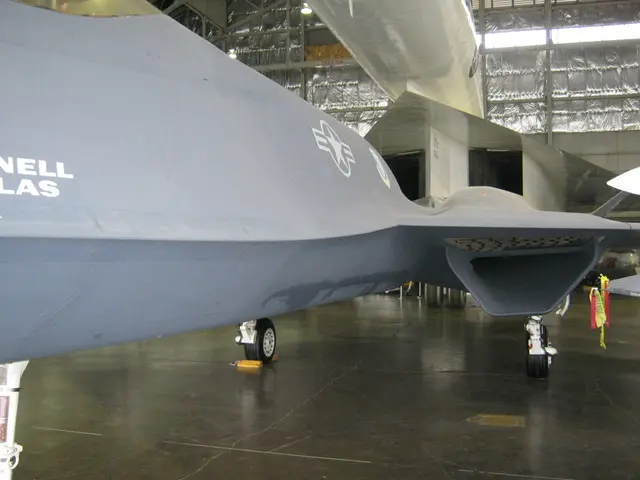MTU Aero Engines Shifting Gears to Avoid US Tariffs on Aircraft Parts
U.S. tariffs evaded by MTU through strategic action plans - Airborne Authority: Strategic Shifts in Response to U.S. Customs Duties
MTU Aero Engines, a renowned German aerospace manufacturer, is leveraging smart strategies to circumvent the sting of US-imposed tariffs on their aircraft parts and components. These measures are crucial as MTU works with key partners like Pratt & Whitney and GE, facing proposed US tariffs on EU imports of around 20%[3].
Selected Strategies
- Logistics overhaul MTU is promptly reworking its logistics and supply chains for specific components and spare parts. For instance, low-pressure turbines currently manufactured in Poland and shipped directly to the US are now being processed in MTU's Munich facility before export. This change minimizes direct exposure to US tariffs, possibly qualifying components for tariff-free export under different trade classifications or agreements[2][1].
- Seeking tariff-free export destinations The company is investigating which countries act as alternative tariff-free export destinations for their products. This move lets MTU divert parts initially designed for the US to other markets, thereby reducing tariff liabilities[2].
- Partial supplier switching and site expansion Although MTU considers supplier changes, the complexity and time needed for such switches (3-5 years) make them challenging to implement swiftly. Building new production sites is also time-consuming and not seen as short-term solutions[2].
- Partnership cooperation MTU works closely with its partners and customers, notably in the US, to implement joint measures that help minimize tariff exposure for all parties involved[1][4].
Impact on Supply Chains
- Heightened complexity The overhaul of logistics and supply chains introduces extra complexity and may lead to longer lead times for certain components. Shifting processing steps between locations can temporarily affect production schedules and inventory management[2].
- Cost pressures Despite these measures, MTU expects a financial strain in the "mid to high double-digit million euro range" for 2025 if no further measures are taken. The company notes that while the main burden falls on its US partners and customers, some costs are inevitable[3][4].
- Profit expectations maintained MTU's mitigation efforts have allowed it to keep its profit outlook for the year. The company reported above-average earnings and cash flow in the first quarter of 2025, although it admits that these figures may change as the tariff impact becomes more apparent[3][4].
In a Nutshell: MTU's Mitigation Strategies and Supply Chain Effects
| Strategy | Description | Supply Chain Impact ||------------------------|-----------------------------------------------------------|--------------------------------------------|| Logistics/Sourcing Rework | Moving processing steps (e.g., Poland to Munich) | Increased complexity, longer lead times || Tariff-Free Destination Search | Redirecting exports to non-US markets | Diversified logistics, reduced US exposure || Supplier/Site Changes (Long-term) | Evaluating new suppliers/sites, but not viable short-term | Long-term planning, stability focus || Partner Collaboration | Joint measures with US partners to minimize tariffs | Enhanced coordination, shared cost burden |
- MTU Aero Engines, endeavoring to avoid US tariffs on their aircraft parts, is revamping the logistics and supply chains for specific components, such as low-pressure turbines, which were earlier manufactured in Poland and shipped directly to the US, but are now being processed in Munich, thus minimizing direct exposure to US tariffs.
- To divert parts initially designed for the US to other markets, MTU is exploring alternative tariff-free export destinations for their products, aiming to reduce tariff liabilities.
- Despite considering partial supplier switching and site expansion, MTU acknowledges the complexity and time needed for such changes, making them challenging to implement swiftly.
- To mitigate tariff exposure for all parties involved, MTU is collaborating closely with its partners and customers, notably in the US, implementing joint measures to minimize tariff impact.








